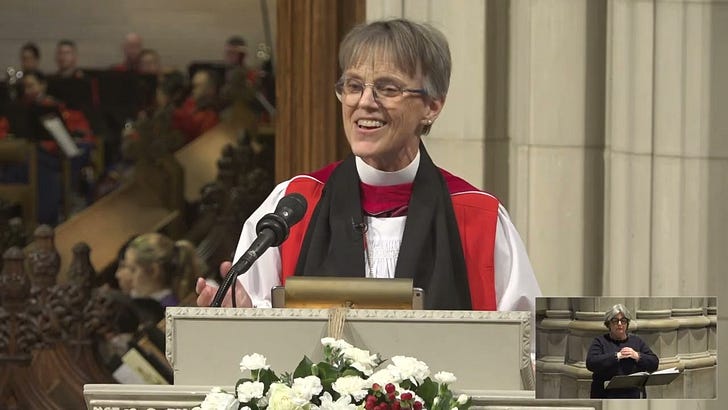Like so many others, I leaned in to hear what the Bishop Marian Budde preached at the Washington National Cathedral earlier this week. I watched later. It was a full day after she had stood in that pulpit when I watched her try to speak her faith. If you missed it, you can watch the whole sermon here.
In that sermon, she concluded by asking for mercy. It’s a word that is so rarely used that it sounds strange, as if it is a quality to inhabit another space and time.
The Bishop was speaking directly to the president. She addressed him by his title when she asked him for mercy but it has left me wondering about my own practice of mercy. It is one of thing to ask those in power to live into this kind of compassion but it is another to embrace the practice for ourselves.
It made me wonder about this word. In his enormous theological work Summa Theologiae, Thomas Aquinas seeks to describe this thing as "the compassion in our hearts for another person's misery, a compassion which drives us to do what we can to help [them]." It is a movement that requires vulnerability and gentleness, and perhaps even justice. Mother Teresa lived in such a way that she hoped others might see the mercy of God. “Do small things with great love,” she encouraged because small things make a difference. It is something that is surprising. It is not earned or deserved, but offered as a gift.
It has healing power. In his book Just Mercy, the lawyer Bryan Stevenson described mercy like this:
“Mercy is just when it is rooted in hopefulness and freely given. Mercy is most empowering, liberating, and transformative when it is directed at the undeserving. The people who haven't earned it, who haven't even sought it, are the most meaningful recipients of our compassion.”
At this moment, I am feeling powerless. It feels as if there is nothing that I can do to bring the hope and healing I so pray for this world. So I am trying to focus on my own practice of mercy. As
observed earlier this week, “Practicing mercy means to center our thoughts and actions in compassion and tenderness rather than righteousness. Righteousness and anger can feel more powerful and they offer a kind of thrill and hit of adrenalin inside your body.”
Mercy is not. It is centered in the heart. (That is Heidi’s wisdom, not mine.) It is tender and soft as much as it is courageous. It reaches out and insists that there is nothing that doesn’t matter to God. Every person matters. Every story counts. Every experience reveals something yet unseen about God’s grace. I confess I don’t know what that is but I am trying to open and listen to everyone and everything with greater compassion, including my own self.
Search for quotes and definitions of mercy to understand what this practice might mean to you right now. Search the whole Bible. Lean into the wisdom of poets and preachers. Play with the words and see if you can find your own definition for the living of these days.
This is a season of simple practices and remembering what really matters. However simple Mother Teresa tried to make it, mercy is a huge practice. It is easy to become overwhelmed.
For now, I invite you to notice what moves you. Every story. Every person. Every encounter that stirs something within you. Without rushing to understand it or explain it, when you notice that thing that moves you, place your hand on your heart. Feel the connection that we share with each other and with God. It is enough.








Thank you for drawing this together in such a "useful" way -- that's not derogatory, I mean a way to pick up and hold so many thoughts. And for adding Heidi Haverkamp's words. I had not seen them and they move beyond the moment of the sermon into the ongoing living of these days.